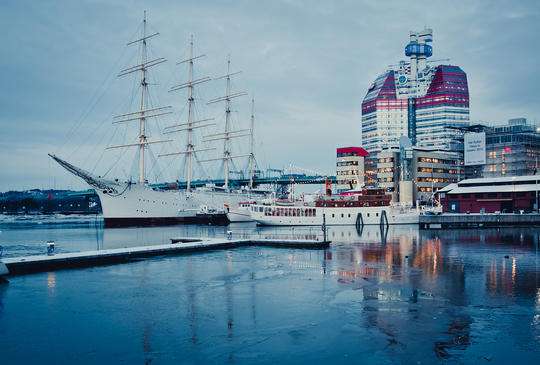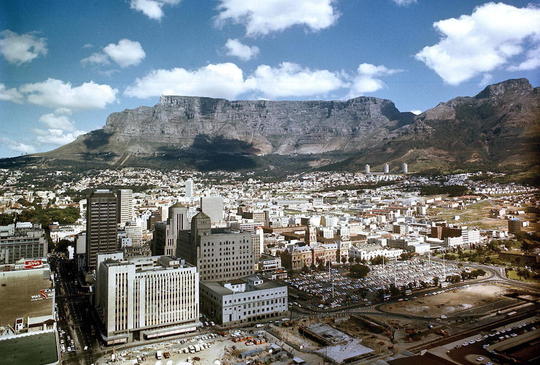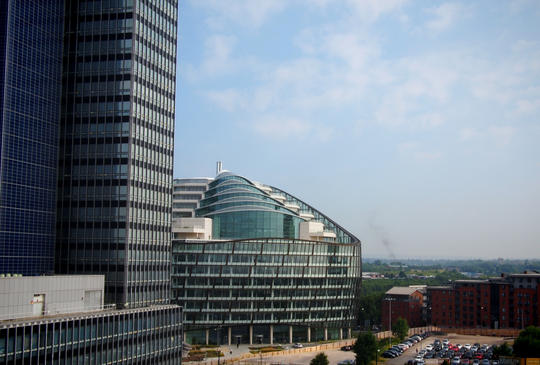
From Gothenburg to Cape Town with Mistra Urban Futures
-
Over half of humanity now lives in cities and the ratio between bumpkins and townies continues to climb in favour of those who choose an urban life; one recent UN estimate suggested that by the end of the century 80% of us will have made cities our home.
For sustainability wonks this means that the sustainable development challenge is intractably linked to how we grow, govern and design our cities. Can we deliver a future where those cities are greener, have a density that reduces sprawl and makes them more efficient, and are fair in terms of reduced polarities between the rich and the poor?
For sustainability wonks this means that the sustainable development challenge is intractably linked to how we grow, govern and design our cities.
This critical question has shaped the programme for an internationally-focused research centre attached to Chalmers University in Gothenburg called Mistra Urban Futures (MUF). This Swedish centre has created a lively and rich programme of projects and partnerships, which includes a series of city partnerships or ‘Local Interaction Platforms’ on sustainability, connected together for shared learning, across Gothenburg itself but also Cape Town, Kisumu, Shanghai and finally, Greater Manchester.
The Greater Manchester Local Interaction Platform (LIP) is led by the University of Salford’s SURF team (and as regular readers of Platform will know, includes the very web portal that you’re reading right now). In Kisumu or Cape Town for example, there have been events, research studentships and other activities to pursue their local LIP goals while here in Greater Manchester, the programme included the creation of a magazine-style knowledge sharing website, which we’ve called Platform, along with projects on the value of community hubs with the Greater Manchester Centre for Voluntary Organisations or on food and austerity.
All of the Local Interaction Platforms are also working on a common project, called Governance and Policy for Sustainability - or GAPS for short. Designed and led by Tim May from SURF at Salford University and Simon Marvin at Durham University, the project looks at how sustainability is governed and delivered in each respective city.
At a recent project workshop in Gothenburg, the shared learning and parallel research programmes began to bear fruit as the cities presented to each other their reflections on ‘sustainability politics’ in their respective cities. With striking and useful similarities between the cities but enough divergence to stretch the thinking gear of those involved, the conversation was a productive one. As Tim May said kicking off the initial session, the key is finding “the main messages we can take to our stakeholders, insight for our policy makers as well as strong academic findings around what is ‘new’ in urban sustainability.”
Gothenburg
The Gothenburg team shared first. As a city region there’s a lot to compare between Gothenburg and Greater Manchester. The city region is made up of 13 municipalities which first joined together as a group in 1995, when they also crafted their first policies on sustainability. The central authority for the city itself is a left-leaning coalition of socialists and greens that serves a population of 500,000; the other metropolitan authorities in the partnership are centre-right and are closer in policy terms to the wider national policy picture. There is a broader ‘business’ region (BRG) that the city region consults with, but the main policy formulation sits with this partnership of 13 authorities.

Even though, according to Stig Egnell one of the leaders of the Gothenburg LIP, “sustainability is something made by politicians, a political product”, the city region does have an ongoing dialogue on sustainability and has identified three headline challenges as the city region seeks to grow and prosper. These are:
- Social polarisation and unsustainable lifestyles;
- Insufficient transport infrastructure; and
- Climate change (mitigation and adaptation).
There is a realisation that facing up to these challenges is critical if Gothenburg is to hit some of its bold, progressive targets (it aims to be zero carbon by 2030, for example) and interestingly, that sustainability is also critical in terms of the city’s image and its attractiveness to talent, investment and business.
“sustainability is something made by politicians, a political product”
Shared prosperity and applying the ‘spirit level’ to Gothenburg is seen by those involved to be also of importance as a lack of social cohesion and opportunity is holding the city back, as is an under-invested transport infrastructure which needs to achieve a modal share of 20-40% by public transport by 2020, particularly to increase liveability and density in the heart of the city. In another parallel with Greater Manchester the city will also be staging a referendum on whether to continue with congestion charging, in September 2014 and there is the rise of a new, local party that’s been winning local council seats with one key policy aim: an end to congestion charging.
Building a broad-based and ongoing sustainability coalition continues to be core thread of the city’s endeavours. From the initial 13 authorities, to the BRG, the strategic transport authority, the private sector, the two main Universities and a network of professionals and experts called HUR2050, the challenge is to build:
- Inter-municipal co-operation and shared working;
- Policy integration, particularly in areas with a poor sustainability record; and
- Integrated, ‘mainstreamed’ sustainability in both government and business.
Whether it’s climate goals or a ‘West Sweden Package’ of major transport improvements to double the adoption of sustainable transport modes, what is encouraging from the Gothenburg experience is that constituencies may come from very different political starting points to support a shared political objective: for example the greens are supporting transport improvements in their aim to get to a carbon neutral city as quickly as possible; for the Chamber of Commerce those same investments and interventions will help to bring customers and suppliers closer together.
The current direction of travel for Gothenburg is captured in their 2013 ‘Sustainable Growth’ strategy which highlights smart transit systems, an end to fossil fuels and a more equitable society as the outcomes they’re aiming for.
Cape Town
With four million citizens Cape Town is a good-sized city region to act as a comparator although its status as a relatively young democracy brings with it a set of very unique challenges including enduring poverty, inequalities and environmental degradation. It too has been through a process of political consolidation moving from 23 individual municipalities when the democratic process began, to seven and now just one, which the city now called the ‘unicity’.

To understand the gap between policy and practice supporting sustainable development in Cape Town, a team of four embedded researchers each working alongside city officials, have reviewed five main policies using six sustainability ‘filters’. The city policies covered:
- Economic growth;
- City growth;
- Climate adaptation;
- Climate mitigation and energy; and
- Its spatial development framework.
Seven main themes have emerged out of the research so far, including an overarching question put by Amy Davison of the City of Cape Town: “How do people know if their policies are making a difference?”
“How do people know if their policies are making a difference?”
One key theme according to Amy Davison and her colleague Zarina Patel from the University of Cape Town’s African Centre for Cities, was the importance of framing sustainability within a context that politicians and stakeholders connect with. “You can’t ever hope to have an impact without addressing the core concerns of the city,” she said. “Ecological sustainability isn’t yet embedded in policy and decision making but some issues, like inequalities, very much are.”
Another theme the Cape Town research has flagged up is the need to unlock institutional knowledge to help deliver sustainability. Even though the wider city region has been through significant changes, some individuals have been in civil service posts for 20 years and have no easy mechanism for sharing a huge wealth of personal experience.
Which links to another theme for Cape Town, the need for more ‘Spaces for Interaction’ on sustainability. The LIP process for Cape Town aside, there is a critical lack of opportunities for policy makers, business and politicians to come together and interact around sustainability issues and create any kind of deliberative process. This lack of a conversation on sustainability is exacerbated by short term electoral cycles that see personalities, and policies, change.
Sustainability as an issue or area of concern does get more traction, it seems, when it plays to the wider aspiration set of the city. Cape Town makes great play of wanting to be a ‘world class’ or ‘design’ city and is highly visible in the national media (not least because it is governed by the opposition party) and so framing sustainability as a way of delivering on those wider set of aspirations looks like a route for success.
Greater Manchester
The GM perspective was delivered by Platform co-founder Beth Perry from the University of Salford (supported, a little, by myself and drawing on research carried out with AGMA Environment Director Mark Atherton)and focused on capabilities, current urban challenges, governance and perceived ‘gaps’ between policies and the delivery of real progress, ‘on the ground’.

The first stage in looking at the ‘politics of sustainability’ in Greater Manchester came with the team (working with key individuals in the Association of Greater Manchester Authorities) mapping out a baseline that took in:
- Specific challenges of urban sustainability in Greater Manchester;
- Formal policies designed to address urban sustainability;
- Roles of different organisations, groups and communities in formulating policies;
- Forums and mechanisms for consultation and participation in formal policy making-processes;
- Mechanisms for and barriers to ensuring that policies are implemented and assessing their effectiveness;
- The evidence base for urban sustainability policy; and
- Relevant activities and groups that remain outside the formal policy process.
In a second phase of work, the team expanded to include Dan Silver and Amina Lone of the Social Action and Research Foundation, alongside the Greater Manchester Low Carbon Hub. They carried out questionnaires returned from key policy leads around areas like climate change as well as workshops and one-on-one interviews.
There is a fragmented knowledge base for sustainability and the risk that lessons are not being learnt between disparate projects or initiatives.
Challenges ranged from the systemic, such as a two-tier governance system and rapidly changing national policy landscape through to a need for more ‘joined-up thinking’ between and across policy areas for sustainable urban development, particularly around social inclusion, diversity and equality. There is a fragmented knowledge base for sustainability and the risk that lessons are not being learnt between disparate projects or initiatives; also a concern that the knowledge of the city region’s universities is not being fully exploited.
The team summarised the problems to be addressed as moving ‘upwards’, ‘horizontally’ and ‘downwards’.
Upwards represents a tendency for agencies and partnerships to look up to UK national policy rather than seeing Greater Manchester as a base for innovation on sustainability and somewhere that can lead rather than follow.
Horizontally there is a lack of joining up between those working on sustainability, no overarching governing body or champion for sustainability and, as with Cape Town, a lack of the spaces needed for the city to have a conversation on sustainability (one of the driving factors behind the creation of this site, Platform).
Downwards there is still a lack of transparency and local voluntary sector groups, BME groups, representatives of community groups and small businesses are underrepresented in city-regional strategy and policy processes.
A full summary of the work can be read here and in the Urban Futures area of this site.
So what can we all learn together?
The three LIPs examined (Kisumu are still synthesising their findings) showed some rich commonalities and also some areas of difference from which each can learn.
There is a common theme of tactical manoeuvring on the part of sustainability enthusiasts across all the cities as they shape and remould their agendas to fit with shorter term shifts in city priorities; it’s clear that sustainability advocates need to be nimble to gain traction.
The image and attractiveness of the city, its status and reputation, is an area where sustainability can ascend up the policy agenda to the highest levels of city leadership; here Greater Manchester’s relationship with the C40 cities was referenced, for example.
The image and attractiveness of the city, it’s status and reputation, is an area where sustainability can ascend up the policy agenda to the highest levels of city leadership.
The need for a shared space, dialogue and ‘shop window’ for sustainability is clear across all the cities, which calls into question what role traditional media is playing in cities with regard to sustainable development; it is a space where sustainability wonks are clearly having to adopt Jello Biafra’s edict: ‘Don’t hate the media, be the media.’
And it is clear that there is a profound gap between policy commitments and practice on the ground, and between the distinctive aims set for sustainability against broader city goals which may cause tensions, for example around unfettered economic development, or the relaxation of planning and threat of urban sprawl.
As the team from Kisumu stated in one MUF workshop, there are commonalities across all our cities and whether it’s academic insights or ways to bridge a policy/action gap, being part of a series of Local Interaction Platforms has already started paying off for each of our cities.
The above outline is based on just one research strand examining policy and governance. For a full set of research reports across a broader range of themes click here.
Top image of Gothenburg is by Flickr user Ulf Bodin under a Creative Commons licence
Inline image of Gothenburg is by Flickr user Henrik Terbeck under a Creative Commons licence
The image of Cape Town is courtesy of the UN Photo Library.
Workshop image is courtesy of Mistra Urban Futures.
Contributor Profile
Steve is co-founder and CEO of Creative Concern. He specialises in ethical and sustainability issues, integrated campaigns, city strategies, brand development and creating strange installations out of trees, lights and beautiful type. Particular areas of expertise include climate change, place making, transport, food issues and the natural environment.





